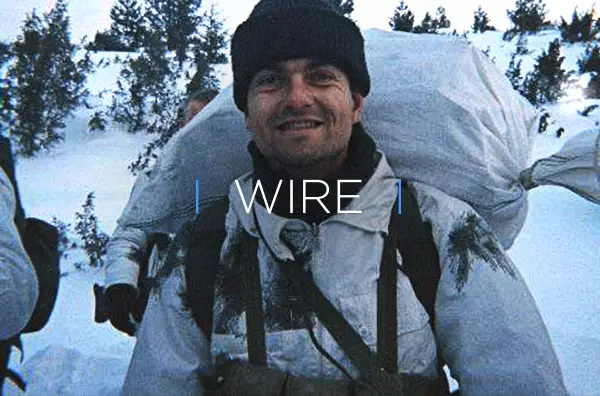
Roland Bartetzko and his platoon take cover in a trench in Bosnia in the former Yugoslavia as they defend themselves from enemy snipers, mortars and grenades. Escaping in small groups, with his troops shooting cover fire, he leaps out over dead bodies, darting from bullets and using his technician skills to connect an AK bayonet to cut through a fence. He then waits for a T-55 tank to cover his retreat.
This isn't a war film or something from Call of Duty on PS3. This is a real profession. After German occupation in World War II, former Yugoslavia combined the Serbs, Croats, Bosnian Muslims, Albanians and Slovenes in a communist regime.
However, in the 1990s the region was devastated by political and economic disaster and calls for independence in Croatia, Slovenia and Bosnia arose. In 1995, Bosnia became independent.
In 1999, Kosovo's ethnic Albanians fought the Serbs in another war to gain independence, causing hundreds of thousands to become displaced and seek refuge outside the region.
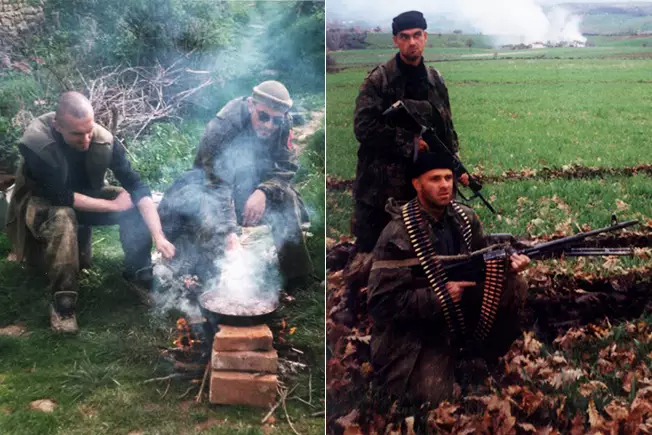
Credit: Roland Bartetzko; Caption: Roland (left) improvises a meal on the front line and (right) stands in front of burning houses after they had been hit by tank fire
Roland's job was to defend the Albanians as a bomb technician in the Kosovo Liberation Army. So what exactly happens in the life of a bomb technician and a career in war? We spoke to Roland to find out.
TheLADbible: When did you become a bomb technician and what did your role involve?
Roland: "I volunteered for the Croatian Armed Forces in Bosnia and later when I joined the Kosovo Liberation Army during the war in Kosovo. In Bosnia, mining and demining was just a thing that you did every day. Every soldier knew how to spot, activate, deactivate and, of course, how to place them.
"In Kosovo I helped to set up and train a Quick Reaction Force. When there was fighting going on we would go out in small groups to defend our villages or attack the enemy. At night time I would assemble small teams and we would go deep into enemy-controlled territory to mine the roads.
"There were very few people who had any practical experience with mines so I taught some soldiers and we formed little mining-demining teams. When the war was over, families came to our base to ask for help with demining. I opened a demining office so that people could directly contact us and didn't have to go through the army bureaucracy."
What kind of work did you do with bombs in the Kosovo War?
Roland: "After the war there were refugees who had fled their country who were now returning, but they were too afraid of the mines to enter their homes. At the same time the NATO troops who were in Kosovo were not allowed to diffuse mines for civilian purposes."
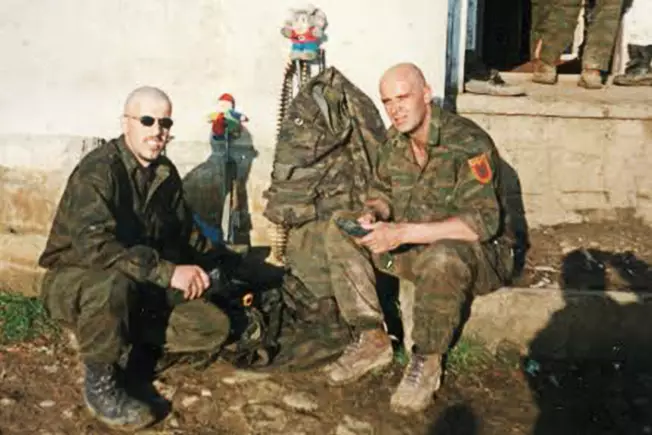
Credit: Roland Bartetzko; Caption: Two of Roland's colleagues in the Kosovo Liberation Army (KLA) have cuddly toys on their rifles to make them less scary for children in the war zone.
Have you ever been in any situations where you risked your life and were close to death?
Roland: "There were several times. One time in Kosovo we were defending our positions from a house when a T-55 tank approached. It was still out of our range so we had to wait for it to come closer. In the meantime, the tank started to shoot at the house we were in.
"Each time a shell hit the house there was a big noise and dust and pieces of brick went all over the place. We went into the basement to find more safety. When I thought that the tank was close enough I grabbed an RPG (anti-tank weapon) and went out of the house to face the tank (you can't shoot this weapon from inside a building).
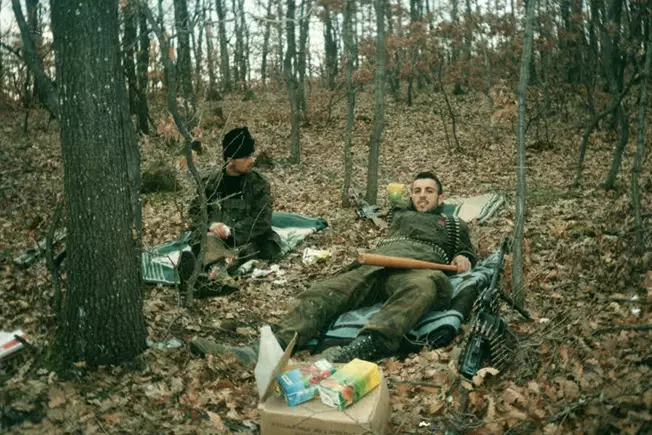
Credit: Roland Bartetzko; Caption: Two KLA soldiers take shelter in a forest after a large scale enemy offensive. The is full of food and cigarettes.
"Outside I fired my RPG and took cover immediately. The tank spotted me and shot back, exactly at the place where I'd been standing only two seconds before. I reloaded, went out again and took another shot at the tank. I then saw that another tank was approaching our position.
"All hell broke loose. The tank crew must have informed their artillery about our position and we got shelled from mortar fire, 30mm anti-aircraft guns and machine guns. We decided to abandon our positions and left the house by a window on the backside. When I got outside the house the air was red from the dust of the houses of red bricks. Grenades hit trees and one fell one metre in front of my feet. Somehow we all made it to a safe place.
"It's quite scary when you have got a tank shooting at you. Still, you do your job and later on you think, 'Oh my God, what just happened?'.
"Another time, after the war in Kosovo, we were searching for hidden mines in an apartment building. On the door of one flat was written: 'Be aware of the white bear!'. It was written in Serbian script, Cyrillic, so we assumed the Serbs who wrote it wanted to warn some other Serbian soldiers. As we searched the house we found a small teddy bear, which we didn't dare to touch. We had a big discussion if it was the right bear and what we should do as it was brown and not white and we were all getting nervous.
"Another comrade came in and asked us what we'd been doing for so long. We pointed and told him about the warning at the door. He grabbed the bear and threw it out of a window while we were running for cover. But nothing happened and everybody started laughing. Tensions were always running high during that time."
That's intense. Did you develop any new fears while working in your position that you didn't have before you started?
Roland: "I got wounded several times. One time in Bosnia we became encircled and we were in a trench with my platoon. Snipers were taking aim while mortar and RPG grenades were hitting the trench. We had to leave the trench in small groups of two or three. When I jumped out of the trench, I ran over a dead body, fell to the ground and started crawling.
"There were bullets everywhere. Another soldier behind me got hit in the leg and started screaming. A Croatian T-55 tank approached to cover our retreat and under its protection we started to evacuate some of the wounded soldiers along the road. From 18 soldiers of our platoon, six were killed that day. Another comrade died later in hospital and three days later more were killed when their car was hit by a mortar grenade.
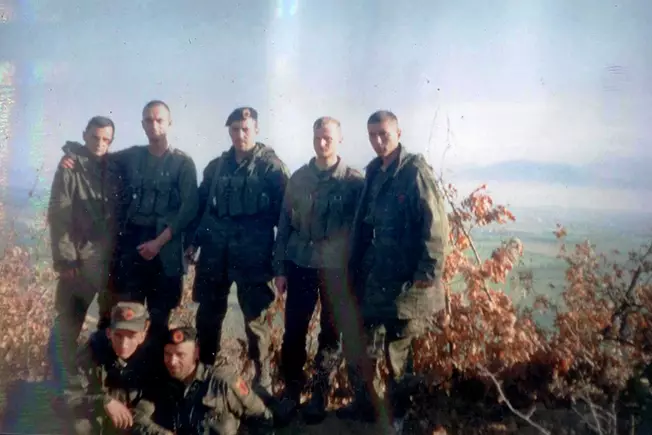
Credit: Roland Bartetzko; Caption: THE KLA faced potential death on a daily basis
"Demining Improvised Explosive Devices (IEDs) isn't a job you should continue for a long time. Most military forces don't even touch these devices, but blow them up with another explosive device. Dismantling bombs like it's shown in the movies where a guy ponders if he should cut the red or blue wire while it's ticking doesn't happen in real life.
"If a mine wounds you, the next time you touch one, your hands are shaking and you start sweating, making the job even more difficult. After a while you reach a point where you have to admit to yourself that you're not useful anymore. I was lucky to have left this job in time and I wouldn't (and probably couldn't) do it anymore."
Interview by Samantha Howard. You can find Roland writing about his experiences on his blog: unconventionalwar.com
Featured Image Credit: Roland Bartetzko; Caption: Roland on the front line